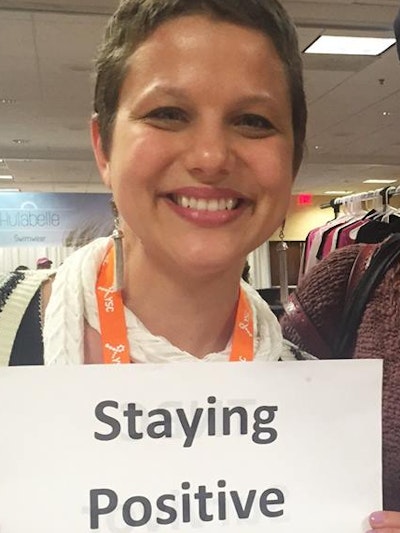You’ve finished your treatment. Now what? This question can be very challenging. Since there’s no long-term treatment for you, you may worry you aren’t doing anything to protect yourself. Questions about cancer coming back or becoming metastatic may distract you.

Survivorship
Fear of Recurrence
With triple-negative breast cancer, the risk of a metastatic recurrence, the breast cancer coming back outside the breast, is strongest in the first five years after your diagnosis. Aggressive cancer cells may travel from the breast to other parts of the body. These cells move through the blood- stream and the pathways that carry fluid away from the breast to the lymph nodes, called the lymphatic channels. The goal of chemotherapy is to kill these stray cells and lower your risk of recurrence.
After five years, your risk of recurrence goes down. In fact, as time goes on, your risk for recurrence may be lower than that of someone treated for estrogen receptor-positive breast cancer.
If you still have breast tissue after surgery, the risk for developing a new breast cancer in the same or opposite breast does not decrease over time. Keep up with regular doctor’s appointments and mammograms to find any new breast cancer.
Most women with triple-negative breast cancer never have a metastatic recurrence or a new cancer. But you may be overwhelmed by worries about breast cancer returning. Birthdays, anniversaries and holidays can bring these emotions to the surface, as can news about a friend, family member or a famous person’s diagnosis. Your fears may be stronger before you go for follow-up appointments and when you wait for test results. To lower your anxiety, share your fears with a trusted friend. Try yoga, meditation or other activities you enjoy.
Dealing with Uncertainty
After treatment ends, you will see your doctor less often, and you may worry more about every new ache or pain. Feeling unsure about whether your treatment worked can make you feel helpless and vulnerable. But you have control over your health. Protect yourself by paying attention to your body, being a good advocate for yourself, going to regular follow-up visits with your doctor, exercising and eating well.
Despite everything you do to protect yourself, you may struggle with your emotions. You have a right to your feelings. You have been through a distressing life event, and you are dealing with the possibility that cancer could return.
Talking with your healthcare team goes a long way toward helping you cope better both during and after treatment. If you have a new pain that persists and lasts longer than a week or two, bring it to your doctor’s attention. If your doctors don’t listen, get a second opinion.
Consider seeking emotional support through counseling, a support group or other programs. It is perfectly normal to seek help to cope with the emotional challenges of a cancer diagnosis. Talking with someone who understands can help a great deal in reducing your distress.
Survivorship Care Plan
You can take control of your follow-up care. Get a treatment summary and create a plan of action for your post-treatment care, also called a survivorship care plan, with your healthcare team and primary care provider. A survivorship care plan should include information about potential long-term side effects of treatment, screening and prevention recommendations, emotional and financial issues, follow-up care referrals, support resources and ways to improve overall health.
Depending on your doctor and the breast cancer stage, you probably will not get more tests and scans after treatment unless you have new symptoms. Large clinical trials show that women with early-stage, triple-negative breast cancer who have routine CT scans and blood tests to check for cancer recurrences during the follow- up period do not do better or live longer than those who do not have the tests. Tests do not pick up most recurrences, and finding them sooner rather than later will not help you live longer. Regular testing can lead to extra tests and surgeries that cause anxiety and could create more medical problems. Extra tests do not help extend life in early-stage breast cancer, whether triple-negative or any other type.
Ongoing Monitoring
After treatment ends, you will see your oncologist every three to six months for the first one to two years; then every six to 12 months for the next three to four years; and then once a year. If you had a lumpectomy, you will get a mammogram or MRI on the remaining breast or breasts.
When you see your doctor, bring your questions. Make sure to tell your oncologist about any new headaches, pains or problems that are out of the ordinary, more severe or last longer than before.
Not having routine tests and scans after treatment ends may increase your fears. You have been through a lot, and you want to know whether the treatment worked. You may feel powerless, but there are things you can do.
Pay attention to your body. Your doctor will give you thorough exams, and you should share your medical history at that time. Do not hesitate to tell your doctor if you aren’t feeling well. You know your body better than anyone, so you are the key to helping your doctor do what is best for you. Doctors find more recurrences through physical exams and good health histories than through testing.
Source: Guide to Understanding Triple Negative Breast Cancer




